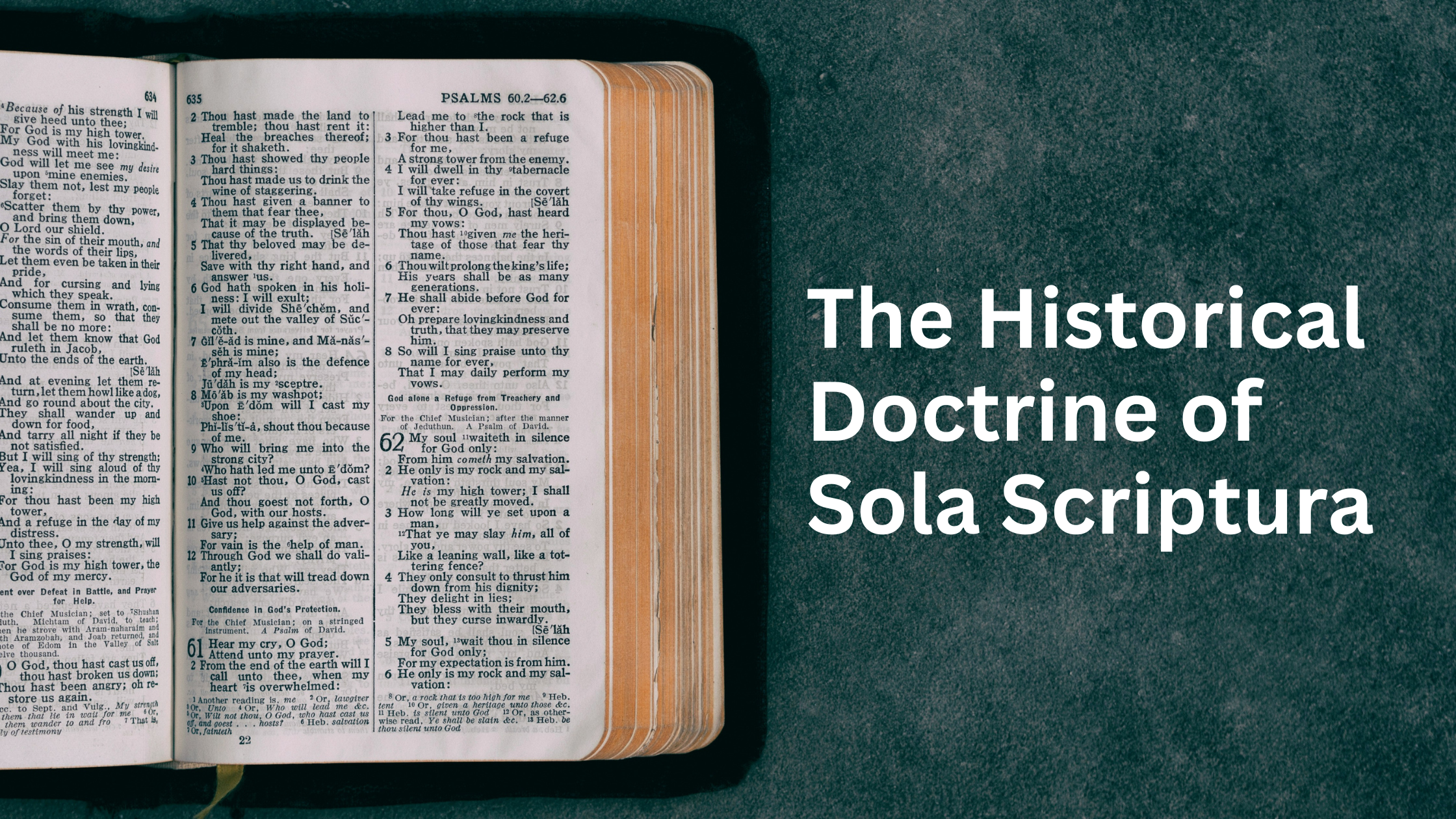Introduction
The main principle of the Reformation is what was later termed “Sola Scriptura,” the Latin for Scripture Alone. What it means is that The Holy Bible, as the true Word of God (2 Tim 3:16), is the highest and supreme authority for Christian believers and churches. It is the only sufficient, infallible measure of faith and practice. As one Reformed confession puts it: “The supreme judge for deciding all religious controversies and for evaluating all decrees of councils, opinions of ancient writers, human teachings, and individual interpretations, and in whose judgment we are to rest, is nothing but the Holy Scripture delivered by the Spirit. In this Scripture our faith finds its final word.”[1]
But this was not just a Reformation invention. As Greg Allison states in his book Historical Theology: “The church has historically acknowledged that all the words in Scripture are God’s words in such a way that to believe and obey the Bible is to believe and obey God himself. For its first millennium and more, the church affirmed and practiced the supreme authority of Scripture.”[2] He notes that Augustine once wrote: “[God] produced the Scripture which is called canonical, which has paramount authority, and to which we yield assent in all matters of which we ought not to be ignorant, and yet cannot know of ourselves.”[3]
Sola Scriptura does not mean that Scripture is our only functional authority in life. As Christians, we are to be humble people who submit ourselves to all rightful authorities, i.e., parents, governments, and church leaders (Exodus 20:12; 1 Peter 2:13-17; Hebrews 13:17). Even church leaders and documents from church history should be seen as helpful guides insofar as they are faithful to Scripture. God has always gifted pastors and teachers to the church to equip the saints for ministry (Ephesians 4:11-12). But submission to earthly authorities (whether in person or writing) is never absolute. There are times to “obey God rather than men” (Acts 5:29).
Additionally, when it comes to church leadership, sermons, Christian writings, and theological traditions, everything must be constantly measured by the Word of God, and it is right for every person listening to venture on this work. Human beings are never infallible and perfect, but we can all collectively look to the Scriptures, which are infallible and perfect.
Examples throughout the Bible
We see the way the Prophets in the Old Testament often corrected Israel and its highest authorities with the Word of God. Priests, prophets, and kings were all regularly called out when they departed from the true, prophetic Word. See for example Amos’ interchange with Amaziah the priest in Amos 7:10-17 or Jeremiah’s rebuke of the lying prophets in Jeremiah 23:23-40. Look at King Josiah, who heard the long-neglected Law of the Lord and started a reformation in the land (2 Kings 22-23).
We see Jesus in the Gospels confronting the Pharisees, Scribes, and Sadducees (the highest religious authorities in Israel) and calling out their traditions for how they departed from the Word of God. He says to the Pharisees (in Mark 7:6-8): “Well did Isaiah prophesy of you hypocrites, as it is written, ‘This people honors me with their lips, but their heart is far from me; in vain do they worship me, teaching as doctrines the commandments of men.’ You leave the commandment of God and hold to the tradition of men.” He says to the Sadducees (Mark 12:24): “Is this not the reason you are wrong, because you know neither the Scriptures nor the power of God?”
We see that the Apostles held to Scripture as the highest authority. They encouraged all believers to pay attention to Scripture and examine teaching by Scripture. 2 Peter 1:19-21: “And we have the prophetic word more fully confirmed, to which you will do well to pay attention as to a lamp shining in a dark place, until the day dawns and the morning star rises in your hearts, knowing this first of all, that no prophecy of Scripture comes from someone’s own interpretation. For no prophecy was ever produced by the will of man, but men spoke from God as they were carried along by the Holy Spirit.” Acts 17:11: “Now these Jews were more noble than those in Thessalonica; they received the word with all eagerness, examining the Scriptures daily to see if these things were so.”
Application
Do you want to be a most-noble believer? Examine the Scriptures when you hear any Christian teaching. Pay careful attention to the Word. Examine your own life and traditions against the commandments of God to ensure you are not following your own way instead of God’s way. Continually seek reformation according to the Word in your life, and the life of your church.
Do not submit to any so-called authority in the church which claims to be on par with Scripture. No Church, Pope, Magisterium, cult Leader, or modern prophet has such authority. True messengers of God today are servants of God and His Word, coming under the authority of the Word themselves and willing to be corrected by it.
When churches submit to Sola Scriptura not just in theory but in practice, this ensures a healthy culture in the church with room for self-correction when we get off track. It ensures leaders can be held accountable even by the lay people who have the Word of God. It ensures that we are always looking to the Lord God himself, asking him what his perfect will is for our lives.
[1]The 1689 (Second London Baptist Confession) in Modern English, 1:10. It is almost verbatim from the Westminster Confession of Faith.
[2]Greg Allison, Historical Theology, 79.
[3]Ibid., 82.
